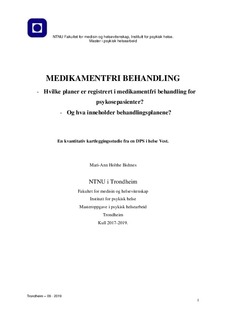| dc.contributor.advisor | Rise, Marit By | |
| dc.contributor.author | Bidtnes, Mari-Ann Holthe | |
| dc.date.accessioned | 2019-10-29T15:01:00Z | |
| dc.date.available | 2019-10-29T15:01:00Z | |
| dc.date.issued | 2019 | |
| dc.identifier.uri | http://hdl.handle.net/11250/2625266 | |
| dc.description.abstract | Sammendrag
Bakgrunn: Medikamentfri behandling har vært etterspurt i mange år fordi mange opplever at medisiner gjør vondt verre. I denne masteroppgaven vil jeg legge særlig vekt på planene i den medikamentfrie behandlingen for psykosepasienter.
Hensikt og problemstilling: Da vi vet at planer er nødvendig for gjennomføringen av et prosjekt blir det viktig å finne ut hvilke planer som finnes i pilotprosjektet medikamentfri behandling for psykosepasienter ved en DPS i Helse Vest, og hva de inneholder. Blir behandlingen gjennomført etter intensjonene?
Metode: Dette er en kvantitativ kartleggingsstudie som har undersøkt journalene til 36 pasienter med psykoselidelse som deltok på medikamentfri behandlingsforløp.
Resultater: 31 av 36 deltakere hadde behandlingsplaner, og 22 av 36 deltakere hadde kriseplaner. Nedtrappingsplaner og individuell plan var en del av behandlingsplanen. Majoriteten av deltakerne benyttet seg av 4 behandlingstiltak hver, men det varierte fra 1-9 behandlingstiltak hver. Alle unntatt en benyttet seg av behandlingstiltak «Samtale». I dette inngår flere ulike typer samtaleterapi og støttesamtaler. Behandlingstiltak «Aktivisering» ble benyttet av under halvparten av deltakerne. Denne undersøkelsen scorer lavt på brukermedvirkning noe som ikke samsvarer med intensjonen. Antall deltakere som ikke brukte antipsykotika er 15 stk., og det var 6 stk. som brukte antipsykotika fast, og 6 stk. som var på nedtrapping. 9 stk. hadde ikke dette dokumentert i planene.
Diskusjon: For at resultatet av behandlingen skal bli så godt som mulig kreves gode planer, dvs. planer med et varierte behandlingstiltak tilpasset hver enkelt deltaker. For å få til dette er samvalg noe som trekkes frem som viktig i pilotprosjektet. Samvalg er en del av brukermedvirkning. Antall behandlingstiltak i planene er også viktig, et variert tilbud vil komme deltakerne til gode. Selv om intensjon for best mulig behandling skjer ved samvalg, så scorer behandlingsplanene lavt på dette området. Dette tyder på at behandlingsplanene ikke primært er deltaker sin, men mer helsepersonell sin. Undersøkelsen viser at du ikke behøver å være medisin fri for å delta på medikamentfri behandling, men målsettingen med medisinfrie behandlingstiltak er å kunne klare seg med så lite medisiner som mulig.
Nøkkelord: psychosis, schizofrenia, Cognitive therapy, Antipsychotic drug, treatment choice, meta-analysis, mortality, medikamentfri behandling, familiesamarbeid, musikkterapi og psykisk helse, IPS og psykisk helse, fysisk aktivitet og psykisk helse. | |
| dc.description.abstract | Abstract
Background: Drug-free treatment has been in demand for many years because many people feel that medication is making the pain worse. In this master's thesis, I will pay particular attention to the plans in the drug-free treatment for psychosis patients.
Purpose and problem: Since we know that plans are necessary for the implementation of a project, it will be important to find out which plans are included in the pilot project drug-free treatment for psychosis patients at a DPS in Health West, and what they contains. Will the treatment be performed according to the intentions?
Method: This is a quantitative mapping study that has examined the records of 36 patients with psychosis disorder who participated in drug-free treatment program.
Results: 31 of 36 participants had treatment plans, and 22 of 36 participants had emergency plans. Step-down plans and individual plans were part of the treatment plan. The majority of participants used 4 treatment measures each, but this varied from 1-9 treatment measures each. All but one of them used the "Conversation" treatment. This includes several different types of call therapy and support calls. Treatment measures "Activation" were used by less than half of the participants. This survey scores low on user participation, which does not match the intention. The number of participants who did not use antipsychotics was 15, and there were 6. who used antipsychotics firmly, and 6 pcs. which was on the downscaling of antipsycotics. 9 pcs. did not have this documented in the plans.
Discussion: In order for the outcome of the treatment to be as good as possible, good plans are required, ie plans with a varied treatment approach adapted to each participant. To achieve this, co-selection is something that is highlighted as important in the pilot project. Co-selection is part of user participation. The number of treatment measures in the plans is also important, a varied offer will benefit the participants. Although the intention for the best possible treatment is by co-selection, the treatment plans score low in this area. This indicates that the treatment plans are not primarily their participant, but more their health care provider. The study shows that you do not need to be medicine-free to participate in drug-free treatment, but the goal of drug-free treatment measures is to be able to manage with as little medication as possible.
Keywords: psychosis, schizophrenia, Cognitive therapy, Antipsychotic drug, treatment choice, meta-analysis, mortality, drug-free treatment, family collaboration, music therapy and mental health, IPS and mental health, physical activity and mental health. | |
| dc.language | nob | |
| dc.publisher | NTNU | |
| dc.title | MEDIKAMENTFRIE FORLØP - Hvilke planer er registrert i medikamentfri behandling for psykosepasienter? - Og hva inneholder behandlingsplanene? | |
| dc.type | Master thesis | |
